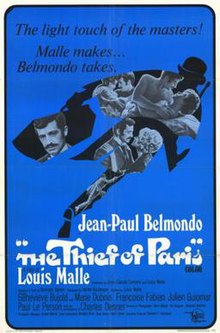
Jean-Paul Charles Belmondo was a French actor. Initially associated with the New Wave of the 1960s, he was a major French film star for several decades from the 1960s onward. His best known credits include Breathless (1960), That Man from Rio (1964), Pierrot le Fou (1965), Borsalino (1970), and The Professional (1981). He was most notable for portraying police officers in action thriller films and became known for his unwillingness to appear in English-language films despite being heavily courted by Hollywood. An undisputed box-office champion like Louis de Funès and Alain Delon of the same period, Belmondo attracted nearly 160 million spectators in his 50-year career. Between 1969 and 1982 he played four times in the most popular films of the year in France: The Brain (1969), Fear Over the City (1975), Animal (1977), Ace of Aces (1982), being surpassed on this point only by Louis de Funès. The popularity of Jean-Paul Belmondo as actor is mainly due to the characters he interpreted in his movies, loving to highlight the virile man, fighter, but also brave and heroic, which appealed to a wide audience in France and also abroad.
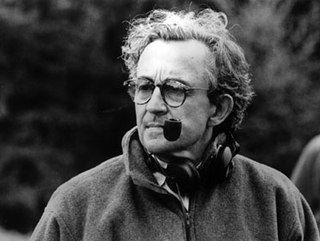
Louis Marie Malle was a French film director, screenwriter, and producer who worked in both French cinema and Hollywood. Described as "eclectic" and "a filmmaker difficult to pin down", Malle made documentaries, romances, period dramas, and thrillers. He often depicted provocative or controversial subject matter.
The Prix Suzanne Bianchetti is an award in French cinema given annually since 1937 to the most promising young film actress.
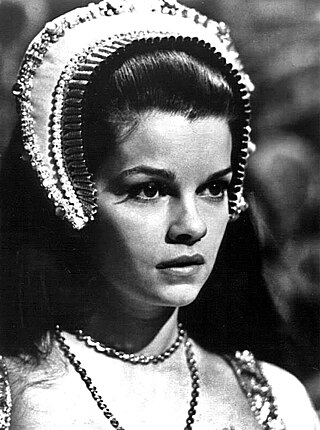
Geneviève Bujold is a Canadian actress. For her portrayal of Anne Boleyn in the period drama film Anne of the Thousand Days (1969), Bujold received a nomination for the Academy Award for Best Actress. Her other film credits include The Trojan Women (1971), Earthquake (1974), Obsession (1976), Coma (1978), Murder by Decree (1979), Tightrope (1984), Choose Me (1984), Dead Ringers (1988), The House of Yes (1997), and Still Mine (2012).

That Man from Rio is a 1964 French-Italian international co-production adventure film directed by Philippe de Broca and starring Jean-Paul Belmondo and Françoise Dorléac. It was the first film to be made by the French subsidiary of United Artists, Les Productions Artistes Associés. The film was a huge success with a total of 4,800,626 admissions in France, becoming the 5th highest earning film of the year.

The Man Who Loved Women is a 1977 French comedic drama film directed by François Truffaut and starring Charles Denner, Brigitte Fossey, and Nelly Borgeaud. The film had a total of 955,262 admissions in France.
Henri Decaë gained fame as a cinematographer entering the film industry as a sound engineer and sound editor. He was a photojournalist in the French army during World War II. After the war he began making documentary shorts, directing and photographing industrial and commercial films. In 1947 he made his first feature film.

Le Casse is a 1971 French-Italian neo noir crime film directed by director Henri Verneuil and starring Jean-Paul Belmondo and Omar Sharif. It is based on the 1953 novel by David Goodis and revolves around a team of four burglars chased by a corrupt policeman in Athens. It's a remake of the 1957 film The Burglar with Jayne Mansfield.

Maurice Ronet was a French film actor, director, and writer.

I Do or Rent a Wife, is a 2006 French romantic comedy film directed by Éric Lartigau, based on an original idea by Alain Chabat. The film stars Charlotte Gainsbourg, Alain Chabat and Bernadette Lafont. It is Chabat and Gainsbourg's third collaboration, after Ils se marièrent et eurent beaucoup d'enfants (2004) and The Science of Sleep (2006). This film was officially remade into an Indian Telugu language film Manmadhudu 2 released in August 2019.

The War Is Over is a French drama war film about a leftist in Franco's Spain, directed by Alain Resnais and starring Yves Montand, Ingrid Thulin and Geneviève Bujold. Joseph Losey directed a sequel, Roads to the South. In July 2021, the film was shown in the Cannes Classics section at the 2021 Cannes Film Festival.

Marie Dubois was a Parisian-born French actress.
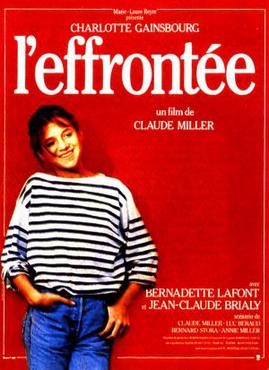
The Impudent Girl is a 1985 French film directed by Claude Miller. It stars Charlotte Gainsbourg, who won the César Award for Most Promising Actress, and Bernadette Lafont, who won the César Award for Best Actress in a Supporting Role. It is a free adaptation of the novel Frankie Addams.
Sweet and Sour is a 1963 French-Italian comedy film directed by Jacques Baratier and starring Guy Bedos. The film was selected for screening as part of the Cannes Classics section at the 2016 Cannes Film Festival.

Web of Passion is a 1959 French/Italian psychological thriller film directed by Claude Chabrol and based on the novel The Key to Nicholas Street by American writer Stanley Ellin. It was Chabrol's first film in colour and his first thriller, which would be his genre of choice for the rest of his career. The film had a total of 1,445,587 admissions in France.

Incorrigible is a 1975 French comedy film directed by Philippe de Broca and starring Jean-Paul Belmondo, Geneviève Bujold and Capucine.
Les Bons Vivants also known as Un grand seigneur or How to Keep the Red Lamp Burning is a French comedy film from 1965, directed by Gilles Grangier and Georges Lautner, that was written by Albert Simonin and Michel Audiard. It stars Bernard Blier, Mireille Darc, Andréa Parisy, Bernadette Lafont, and Louis de Funès.

Male Hunt is a 1964 comedy film directed by Édouard Molinaro and starring Jean-Claude Brialy, Catherine Deneuve, Marie Laforêt, Claude Rich, Françoise Dorléac and Jean-Paul Belmondo.
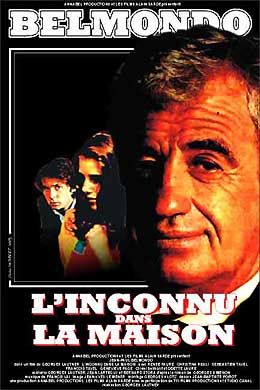
Stranger in the House is a 1992 French crime drama directed by Georges Lautner and starring Jean Paul Belmondo. It is based on a novel by Georges Simenon, previously filmed by Henri Decoin in 1942.

Cartouche, King of Paris or just Cartouche is a 1950 French historical adventure film directed by Guillaume Radot and starring Roger Pigaut, Renée Devillers and Claire Duhamel. The film's sets were designed by the art director Marcel Magniez. It portrays the eighteenth century highwaymen Louis Dominique Bourguignon, known as Cartouche.
